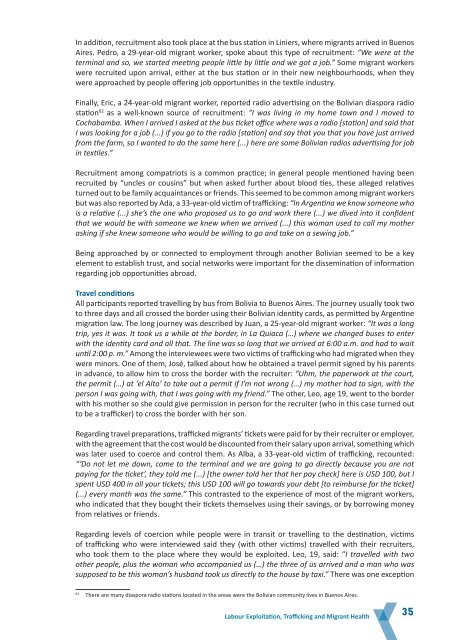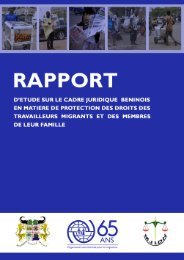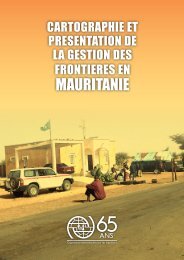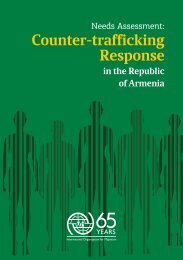Labour Exploitation Trafficking and Migrant Health
labour_exploitation_trafficking_en_0
labour_exploitation_trafficking_en_0
You also want an ePaper? Increase the reach of your titles
YUMPU automatically turns print PDFs into web optimized ePapers that Google loves.
In addition, recruitment also took place at the bus station in Liniers, where migrants arrived in Buenos<br />
Aires. Pedro, a 29-year-old migrant worker, spoke about this type of recruitment: “We were at the<br />
terminal <strong>and</strong> so, we started meeting people little by little <strong>and</strong> we got a job.” Some migrant workers<br />
were recruited upon arrival, either at the bus station or in their new neighbourhoods, when they<br />
were approached by people offering job opportunities in the textile industry.<br />
Finally, Eric, a 24-year-old migrant worker, reported radio advertising on the Bolivian diaspora radio<br />
station 62 as a well-known source of recruitment: “I was living in my home town <strong>and</strong> I moved to<br />
Cochabamba. When I arrived I asked at the bus ticket office where was a radio [station] <strong>and</strong> said that<br />
I was looking for a job (...) if you go to the radio [station] <strong>and</strong> say that you that you have just arrived<br />
from the farm, so I wanted to do the same here (...) here are some Bolivian radios advertising for job<br />
in textiles.”<br />
Recruitment among compatriots is a common practice; in general people mentioned having been<br />
recruited by “uncles or cousins” but when asked further about blood ties, these alleged relatives<br />
turned out to be family acquaintances or friends. This seemed to be common among migrant workers<br />
but was also reported by Ada, a 33-year-old victim of trafficking: “In Argentina we know someone who<br />
is a relative (...) she’s the one who proposed us to go <strong>and</strong> work there (...) we dived into it confident<br />
that we would be with someone we knew when we arrived (...) this woman used to call my mother<br />
asking if she knew someone who would be willing to go <strong>and</strong> take on a sewing job.”<br />
Being approached by or connected to employment through another Bolivian seemed to be a key<br />
element to establish trust, <strong>and</strong> social networks were important for the dissemination of information<br />
regarding job opportunities abroad.<br />
Travel conditions<br />
All participants reported travelling by bus from Bolivia to Buenos Aires. The journey usually took two<br />
to three days <strong>and</strong> all crossed the border using their Bolivian identity cards, as permitted by Argentine<br />
migration law. The long journey was described by Juan, a 25-year-old migrant worker: “It was a long<br />
trip, yes it was. It took us a while at the border, in La Quiaca (…) where we changed buses to enter<br />
with the identity card <strong>and</strong> all that. The line was so long that we arrived at 6:00 a.m. <strong>and</strong> had to wait<br />
until 2:00 p. m.” Among the interviewees were two victims of trafficking who had migrated when they<br />
were minors. One of them, José, talked about how he obtained a travel permit signed by his parents<br />
in advance, to allow him to cross the border with the recruiter: “Uhm, the paperwork at the court,<br />
the permit (…) at ‘el Alto’ to take out a permit if I’m not wrong (…) my mother had to sign, with the<br />
person I was going with, that I was going with my friend.” The other, Leo, age 19, went to the border<br />
with his mother so she could give permission in person for the recruiter (who in this case turned out<br />
to be a trafficker) to cross the border with her son.<br />
Regarding travel preparations, trafficked migrants’ tickets were paid for by their recruiter or employer,<br />
with the agreement that the cost would be discounted from their salary upon arrival, something which<br />
was later used to coerce <strong>and</strong> control them. As Alba, a 33-year-old victim of trafficking, recounted:<br />
“‘Do not let me down, come to the terminal <strong>and</strong> we are going to go directly because you are not<br />
paying for the ticket’, they told me (...) [the owner told her that her pay check] here is USD 100, but I<br />
spent USD 400 in all your tickets; this USD 100 will go towards your debt [to reimburse for the ticket]<br />
(...) every month was the same.” This contrasted to the experience of most of the migrant workers,<br />
who indicated that they bought their tickets themselves using their savings, or by borrowing money<br />
from relatives or friends.<br />
Regarding levels of coercion while people were in transit or travelling to the destination, victims<br />
of trafficking who were interviewed said they (with other victims) travelled with their recruiters,<br />
who took them to the place where they would be exploited. Leo, 19, said: “I travelled with two<br />
other people, plus the woman who accompanied us (…) the three of us arrived <strong>and</strong> a man who was<br />
supposed to be this woman’s husb<strong>and</strong> took us directly to the house by taxi.” There was one exception<br />
62<br />
There are many diaspora radio stations located in the areas were the Bolivian community lives in Buenos Aires.<br />
<strong>Labour</strong> <strong>Exploitation</strong>, <strong>Trafficking</strong> <strong>and</strong> <strong>Migrant</strong> <strong>Health</strong><br />
35





